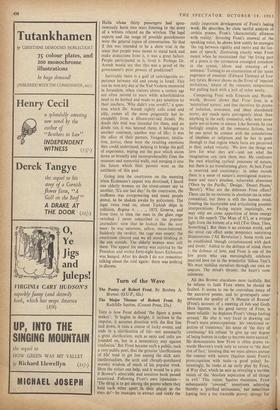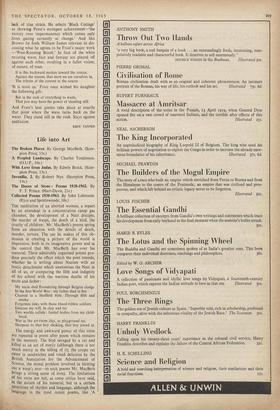Turn of the Wave
The Poetry of Robert Frost. By Reuben A. Brower. (O.U.P., 42s.) Tins is how Frost defined 'the figure a poem makes': 'It begins in delight, it inclines to the impulse, it assumes direction with the first line laid clown, it runs a course of lucky events, and ends in a clarification of life—not necessarily a great clarification, such as sects and cults are founded on, but in a momentary stay against confusion.' But Frost became such a public, such a very public poet, that the genuine 'clarifications of life' tend to get lost among the slick anti- intellectualism, the arch and cheaply-purchased woodsy wisdom of much of his popular work. Here the critics can help, and it would be a pity if Brower's admirable and sensitive book passed unnoticed. Following Frost's own injunction— 'The thing is to get among the poems where they hold each other apart in their places as the stars do'—he manages to extract and vivify the
really important development of Frost's lasting work. He describes, by close tactful analysis of certain poems, Frost's 'characteristic alliances with reality.' Stressing Frost's renewal of the speaking voice, he shows how subtly he manages 'the tug between rigidity and metre and the 'lax- ness of speech,' illustrating exactly what Frost meant when he maintained that 'the living part of a poem is the intonation entangled somehow in the syntax, idiom and meaning of a sentence.' Turning to an examination of the 'quiet eagerness of emotion' (Edward Thomas) of four key lyrics, Brower shows us the Frost of 'rejected invitations,' aware of the romantic temptations but pulling back with a jerk of sober sanity,
Comparing Frost with Emerson and Words- worth, Brower shows that Frost lives in a 'neutralised nature,' and that therefore his poems of isolation, severance, and sheer abandoned terror, are much inore astringently bleak than anything in the early romantics, who were never quite not-at-home in nature. Like Stevens, he can feelingly employ all the romantic fictions, but he can never be content with the consolations of idealism or solipsism and he has to push through to that region where facts are perceived in their naked veracity. 'We love the things we love for what they are'—and not what the imagination can turn them into He confronts the vast wheeling, cyclical processes of nature, but there is no transforming glory. At best Frost is reserved and cautionary: in other moods there is a sense of nature's unmitigated malevo- lence and man's desolate, vulnerable aloneness ('Once by the Pacific,' Design,"Desert Places,' 'Bereft). What are the defences Frost offers? There can be no recourse to absolutes (as in other romantics), but there is still the human mind, fronting the inscrutable and articulating possible interpretations. Facing nature inquiringly, we may only see some apparition of brute energy (as in the superb 'The Most of It'), or a strange light from the bottom ()fa well ('For Once, Then, Something'). But there is an external world, and the mind can effect some temporary sustaining illuminations ('All Revelation'). Some truth can be established 'though circumstanced with Clark and doubt.' Added to the defence of mind, there i, the defence of love, and Frost is one of the few poets who can meaningfully celebrate married love (as in the wonthrful 'Silken Tent'). We must stabilise ourselves through our own re- sources. The mind's thrusts; the heart's com- mitments.
All this Brower elucidates most tactfully. But he refuses to fault Frost where he should be faulted. It seems to me he overvalues many of the narrative poems, and he grotesquely over- estimates the quality of 'A Masque of Reason' (Frost's account of a meeting .of Job and God). Here Squires, in his good survey of Frost, is more reliable: he deplores Frost's 'cheap fooling around.' He also is very lucid in drawing out Frost's main preoccupations: his 'emotional re- jection of transience,' his sense of 'the duty of continuing,' his refusal 'to give up any degree of being human in order to become more natural.' He demonstrates how Frost is often drawn to- wards Heaven's truth only to return to 'the dear riot of fact,' insisting that we must always pursue the contest with nature (Squires notes Frost's preoccupation with tools—a good point). In- terestingly, he looks at an early play by Frost, A Way Out, which he sees as revealing a terrible vision of the 'desolate separation of all things in evil.' This vision, Squires maintains, Frost subsequently 'covered,' sometimes achieving thereby a 'purified seriousness,' but sometimes lapsing into a too tractable poetry, spongy for lack of true strain. He selects 'Black Cottage' as showing Frost's strongest achievement—'the victory over impermanency which comes only from gazing earnestly at change.' And like Brower he finds William James relevant in dis- cussing what he agrees to be Frost's major work —'West-Running Brook.' In face of the white resisting wave, fact and fantasy are played off against each other, resulting in a fuller vision; of nature, of man.
It is this backward motion toward the source, Against the stream, that most we see ourselves in, The tribute of the current to the source.
'It is most us.' Frost once wished his daughter the following gift : But in the rush of everything to waste, That you may have the power of standing still.
And Frost's best poems take place at exactly that point where the wave turns back on the water. They stand still in the rush. Stays against confusion.
TONY TANNER



































 Previous page
Previous page